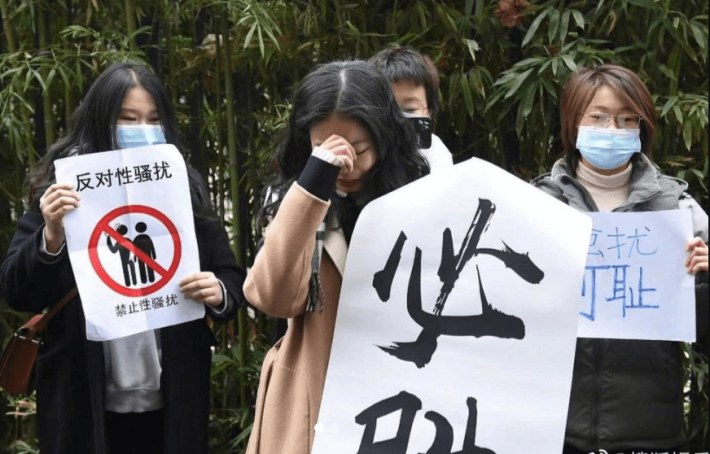BY LIJIA ZHANG
Chinese courts should place more weight on testimony and change its stance towards alleged harassers, so that more survivors can come forward.
This essay was originally published at the South China Morning Post.
Zhou Xiaoxuan, the face of China’s #MeToo movement, has just lost her landmark case. A Beijing court ruled that she had “tendered insufficient evidence” against a star presenter.
Zhou, better known by her online nickname Xuanzi, first alleged in 2018 that Zhu Jun had forcibly kissed and groped her in a dressing room four years earlier, when she worked as an intern at China Central Television. Her action helped spur the #MeToo movement in China and led many other women to speak out about their grievances. She sued Zhu last year. He denied the allegations.
As a victim of sexual abuse at the hands of a maths teacher at my primary school, I am bitterly disappointed by the court ruling, yet I am not too surprised. The sad truth is that China’s legal system tends to favour the defendant in such cases.
“When survivors sue harassers, they, like most plaintiffs in civil litigation in China, must prove their claims to the court to a ‘high degree of likelihood’, but meeting this high bar is extremely challenging,” Darius Longarino, a senior fellow of the Paul Tsai China Centre at Yale Law School, told me.
Since sexual misconduct usually takes place in private space and between two people, there are not always witnesses or hard evidence such as recordings or text messages. Without them, however, survivors almost always lose because the Chinese judges give little credence to litigant testimony.
Even if there is hard evidence, it is not certain that judges will see it. Zhou said that the court rejected her lawyer’s efforts to present evidence, including video footage from outside the dressing room. “Ultimately, the court didn’t give us any space for making a statement,” she said in a statement after the verdict.
Sexual harassment only entered China’s legal scene in recent decades. In 2005, the country first enacted a national law prohibiting sexual harassment. It was followed by a flurry of regulations introduced by local authorities. In 2012, the State Council went further, stipulating that employers should curb sexual harassment in the workplace.
Despite a string of legal provisions, very few sexual harassment survivors have filed lawsuits. A 2018 study conducted by the Beijing Yuanzhong Gender Development Centre revealed the shockingly low number.
Among the more than 50 million court cases from 2010 to 2017, only 34 of them involved sexual harassment. Of the 34 cases, only two were brought by victims suing their abusers, and both lost.
Both plaintiffs were courageous. Usually, the massive legal and societal hurdles have kept victims quiet. According to a 2020 survey of 50,000 university students, only 3.88 per cent said they would report sexual violation to the police.
Apart from the legal barriers, societal prejudice against survivors has also shamed many into silence. Zhou has experienced plenty of criticism and attacks. Someone reportedly told her, “Your voice is very dia [coquettish or flirtatious]. So you should take some responsibility for what happened to you.” The culture of victim-blaming is deeply rooted.
In recent years, educational institutes have started to pay a little more attention to sexual harassment. Some of their safety guidelines, however, contain dubious information.
Last year, the China Academy of Art, a prestigious fine arts college, sparked an outcry after it published a safety handbook for first-year students which attributes campus sexual misconduct to women themselves.
In the section titled “Factors that cause sexual assault”, it first made reference to the “internal characteristics of women”, which includes “focusing too much on dressing” and “being beautiful and frivolous”.
When survivors decide to bring their abusers to court, they have much to lose and little to gain, given the social stigma and limited reward in the unlikely event that they win. Yet, the Chinese courts seem blind to their plight.
The low number of sexual harassment lawsuits does not mean the problem is imaginary. On the contrary. Surveys have shown that around 40 per cent of Chinese women have been sexually harassed. People’s hesitancy to go to court indicates that the law is not serving as an effective tool to address the problem.
Judges should place more weight on litigant testimony, which would require them to spend more time assessing the evidence provided by both parties. In Zhou’s case, the defendant wasn’t even required to appear in court.
The court should also reconsider the “high degree of likelihood” requirement, which some legal scholars believe to be 75 per cent to 85 per cent certainty. It is high compared to other parts of the world.
Anglo-American common law uses the “preponderance of the evidence” standard in civil litigation. Plaintiffs only need to prove that their claims are more likely than not to have occurred, which means above 51 per cent certainty, lower than the criminal standard of “beyond a reasonable doubt”.
Germany uses the civil law system, like China. There, judges are willing to shift the burden of proof back and forth between the parties to bring the truth to light.
China has definitely made legal progress. New rules make it harder for courts to arbitrarily reject cases. Last year, a civil code was introduced, aimed at cracking down on sexual misconduct. For the first time, it laid out the definition of sexual harassment.
Yet, far more needs to be done. The key issue is for the court to change its stance towards alleged harassers so more victims will come forward, and their rights will be duly protected.

About the author
Lijia Zhang is a factory-worker-turned writer, social commentator and public speaker. One of the few Chinese who write regularly in English for international publications, her articles have appeared in The Guardian, The South China Morning Post, Newsweek and The New York Times. She is the author of the critically acclaimed memoir “Socialism Is Great!” about her decade-long experience of working at a rocket factory in Nanjing and her debut novel Lotus, on prostitution in contemporary China, was published by Macmillan and was featured by BBC radio’s World Book Club. She is a recipient of the prestigious fellowship on the International Writer’s Program at the University of Iowa. Lijia has lectured at many conferences, institutions and universities around the world, including Asia EU Economic Forum, European Institute for Asian Studies, The University of Sydney, Harvard, Columbia, Stanford and Oxford. She is a regular speaker on the BBC, Channel 4, CNN and NPR. She divides her time between London and Beijing.

